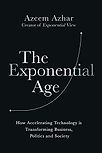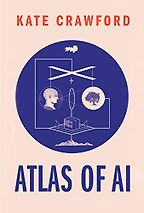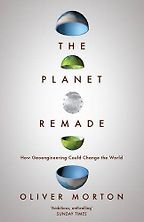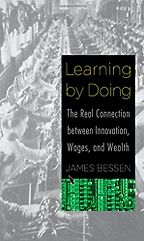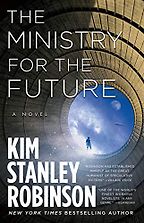Before we get to the books you’ve recommended, could you tell us about your concerns about tech? Is it that we are in danger of getting left behind by technology?
It’s not so much that we’re being left behind by technology, it’s more that we’re in a bit of a transition where a series of different, general-purpose technologies are being developed and rolled out throughout our economies by businesses. Individuals are using them as well. These technologies are improving at what I call ‘exponential rates’, which has a particular meaning that I set out in my book. The key point is that the technology I’m talking about is not just some amorphous blob getting faster and faster. My concerns relate to general-purpose technologies, which tend to reshape the way we organise the world and our everyday affairs and our societies, economies, firms, industries and all the rest.
My focus is on four specific technologies that are accelerating very, very rapidly. This changes the tempo, the cadence, the choreography of our societies. These technologies change the rules and so we need to change our rules in order to harness them effectively. If we don’t change those rules, we run into this problem that I call ‘the exponential gap,’ which essentially says that rules and institutions haven’t caught up with the potential of the technology, both good and bad. That’s problematic because those rules and institutions and norms and habits are what makes life easy to live for all of us.
Could you give one example of an institution that might get left behind by the march of tech if it continues to do things the current way?
Our taxation system is a good example. The taxation system assumes that products are physical products that are easy for a taxman to track. Then, when they get sold or bought or your labour gets sold or bought, it’s easy for us to track and figure out how we meet our social obligations to pay tax. In the exponential age, you can easily do work across borders and lots of products are actually rather intangible. So they slip under the normal purview of the tax authorities. So you get this funny situation where certain activities are highly profitable, but don’t seem to attract tax in ways that we might have thought were reasonable.
Let’s move on to the books you’ve recommended to understand more about how you think about technology and its impact. First up is Atlas for AI: Power, Politics and the Planetary Costs of Artificial Intelligence, by Kate Crawford.
Kate is a wonderful academic, really brilliant, and she has taken a look at the technology of artificial intelligence. In her view, it’s neither artificial nor particularly intelligent. Its use often masks a set of industrial processes and complex supply chains that bury within them deep inequalities and disparities in power.
“We’ll always be a high tech society because we can’t put the genie back in the bottle”
What she aims to do in the book is use this structural and political analysis to bring to the fore what happens behind what we think of as the ‘magic’ of our phones opening up when they see our faces. An example of that in Kate’s book is that a lot of the AI systems that we use today have required these systems to be trained by humans. The humans who do the training are often in emerging markets or poor economies, not being paid very well to go through the slightly mind-numbing task of training a machine to recognise what a dog is, and what a cat is. That’s just one example that she brings up. I found the book really thought-provoking and challenging—although I don’t agree with every part of her analysis.
Does she have solutions that she thinks could be implemented? Or is the book more about sketching the landscape of the problem rather than providing solutions?
In the explanation of the symptoms, she also talks about the way in which those symptoms emerge. From that, you can see what types of policies you could enact to address them. But I think a large part of this is about transparency, and letting people be aware of how their products get to their table. One of the things that Kate identifies for us is something that we’ve become very easy with—how other products get to us. For example, when we have a hamburger delivered at home on a weekend, we never give a moment’s thought as to how that was produced and delivered from farm to plate.
AI is often presented, in Kate’s view, as a magical technology. Her point is that, actually, behind it are a lot of structures of labour and resource extraction and resource use and power disparity that perhaps we should think about.
Next up we have The Planet Remade: How Geoengineering Could Change the World.
This was written by Oliver Morton, who is just a brilliant writer and longtime science editor at the Economist. I worked with him nearly 30 years ago. I’ve been thinking about questions of geoengineering—whether we will need to embark on active geoengineering to deal with the risk of climate change. Oliver is one of the popularisers of those ideas. This book is a classic. It has a literary style. He makes the argument that people are quite seriously thinking about how we might engage in certain types of geo-engineering.
We’re talking about things like changing the weather by creating clouds, is that right?
That kind of thing. It is about whether we could seed clouds, or cultivate photosynthetic plankton; or whether we could build some kind of a veil to reduce the solar irradiation of the planet using droplets or other techniques.
One of the things that Oliver does is point out that we have already geo-engineered large parts of the nitrogen and carbon cycle over thousands and thousands of years. Artificial fertilisers are a geoengineering of the traditional nitrogen cycle. So he presents that familiarity as a way of saying, ‘Look, let’s start to think a little bit about the moral implications of how we respond to climate change.’ What comes across quite well in the book is that the people who are thinking about geoengineering are not Dr Strangelove characters, they’re actually thinking about how we care for the planet, or not, and how we control it.
Next up is Learning by Doing: The Real Connection Between Innovation, Wages, and Wealth by James Bessen.
Economic historians who go back and look at the evidence of previous technology shifts are incredibly helpful. When I was researching my book, I was struck by how many of the questions that we are contending with, at least from the perspectives of labour markets, and the economy and economic structure, were questions that have been asked in previous transitions.
Bessen’s questions, at a broad level, are quite similar to something I ask in my book, which is, ‘Why do we feel the impact of technology everywhere, except in wages?’ His argument is that it takes time to acquire the relevant knowledge and skills when a new technology emerges. He has a wonderful example of how long it took for typewriters to result in higher wages for the growing pool of typists. Many of the dynamics that we see in the computer industry played out 100 years ago with typing. There were many different typewriter standards, then they settled on one, and then you had typewriting school, and it drove increasing wages. It just took a long time for companies to figure out how to use this new technology.
“Many of the dynamics that we see in the computer industry played out 100 years ago with typing”
One of his key points is that a lot of this technical knowledge is picked up on the job, not through the classroom, which is why he calls it ‘learning by doing.’ It speaks to the importance of having that kind of apprenticeship model when you’re trying to get these technologies across.
A lot of the work that I did was around this idea that many of the key aspects for driving adoption of technologies related to learning. So I was really interested to try to understand recent analyses of learning, in its broadest sense, around new technologies.
And is the story about the future of tech and work that he tells in the book fundamentally a positive one? Or is it positive only if we get structures and institutions right?
It’s basically positive. Bessen talks about the kinds of incentives and policies that are needed to foster learning on the job, really with a US angle. Another point he makes is that this also relates to the balance of power between the providers of capital and the workers. Whenever you talk or think about policies like this, you’re always also thinking about how political power plays out between labour and capital.
Let’s move on to the novel you’ve chosen, the Ministry for the Future by Kim Stanley Robinson. Why have you put this book on your list of the best tech books?
Stan has been thinking really hard about what used to be distant speculative fiction in our relationship with our environment. As he says, the timeline gets shorter and shorter and Ministry for the Future is set in the highly accessible, very-near future.
One of the things that he does very, very well is he draws a path through what climate change—and the worst aspects of climate change—might look like. Some of it’s quite hard. The book opens with one of the most searing chapters on anything that I’ve ever read, which is a minute-by-minute account of an incredible heatwave in India, which is above what’s known as the ‘wet-bulb’ temperature. The ‘wet-bulb’ temperature is a point at which human beings essentially get poached in their own skin unless they have air conditioning. You can’t cool yourself at a wet-bulb temperature, you need a machine to cool you down. Of course, in India, where this happens, there aren’t that many cooling machines around. He takes you through that.
Then he focuses on a couple of characters and he throws up some really interesting ideas. So there is a rather formal bureaucratic decision to create something called ‘the Ministry for the Future’ that is going to think about the future and think about how to bring people together and get them to act. At the same time, there is the pressure of unilateralism, so certain governments engage in their own solar geoengineering. There is also the arrival of eco-terrorism, people who take private planes out of the sky and attack Davos meetings and sink ships and so on.
What he focuses on is the reality of the policymaking and this sense that, at some point, the background of this will just be normal, everyday politics. What he finally paints as the outcome is interesting. It’s a really re-wilded world, with a much slower pace. People use much less energy. I have some questions about whether the planet will accept that, whether politics will allow that to happen, but I think it’s worth a read for anyone, really.
The endpoint of the book is still a high tech society, right?
We’ll always be a high tech society because we can’t put the genie back in the bottle. It’s more that the pace changes. There are sailing ships, rather than diesel-powered ships. There are airships. There are many, many people who viscerally feel the shock of climate deaths and the destruction of humanity and their environment and that is what triggers their value shift to live on less energy every day and to reuse and recycle.
There’s a large aspect of what I would call ‘slow tech’ in there. It’s not one of these books where the end state is that we suddenly get nuclear fusion power and carbon sequestration and technology saves the day. There are definitely key technical aspects, like the introduction of a carbon cryptocurrency that incentivises people to sequester carbon, which is great news for farmers around the world.
The final tech book you’ve chosen is How Solar Energy Became Cheap: a Model for Low-Carbon Innovation. What does this tell us about how tech will affect the future?
This is quite a technical book. I’m not going to pretend it’s not. However, what Gregory Nemet does is explain this really strange phenomenon, which is that solar power has got incredibly cheap. It’s got almost comedically cheap and continues to get cheaper. The question is, why did that happen? The trivial answer people come up with is that it’s all being subsidised by governments, but that’s simply not the full, or the correct, picture.
Solar energy provides a usable framework for how to think about getting difficult, but powerful technologies, affordable, and more broadly available and accessible in ways that are generally very, very good for us. What I appreciated about the book was the historical analysis of a technology’s use and growth over the last 50 or 60 years. He very clearly describes, within a historical framework, the mechanisms of how and why this all happened. This is something I think that policymakers could pick up on. They could ask, ‘How do we apply this sort of framework elsewhere?’ There are so many important technologies that I think we could benefit from that would also benefit from being analysed in this way.
Interview by Benedict King
December 20, 2021. Updated: February 14, 2025
Five Books aims to keep its book recommendations and interviews up to date. If you are the interviewee and would like to update your choice of books (or even just what you say about them) please email us at [email protected]
Five Books interviews are expensive to produce. If you've enjoyed this interview, please support us by donating a small amount.

